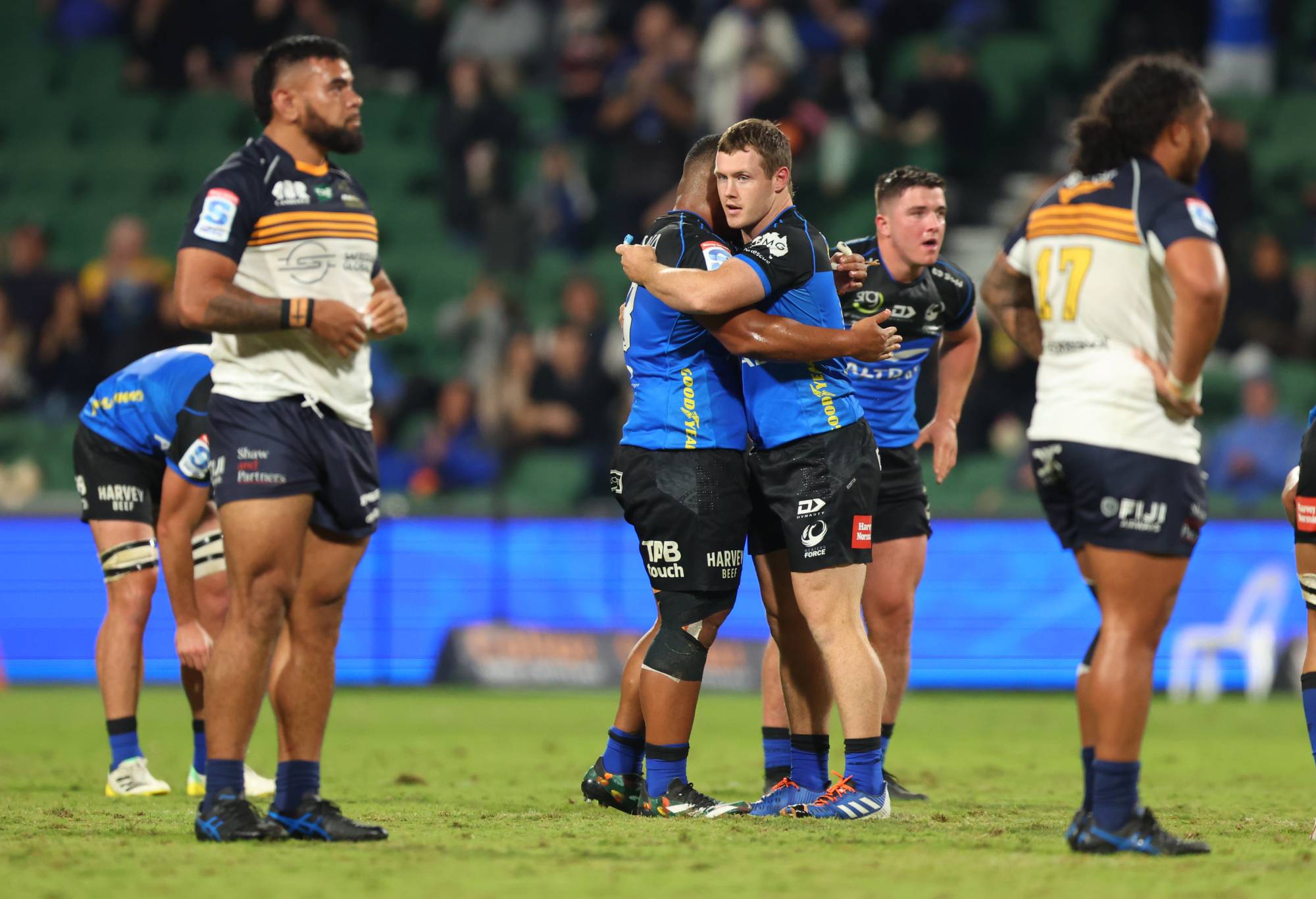Controversial Rugby Australia resting policy to be shelved after Wallabies disaster

In welcomed news for Super Rugby franchises and fans, Rugby Australia’s controversial workload management policy is set to be scrapped in 2024.
In recent years Super Rugby coaches were asked to stand down players of national interest for up to two additional rounds to ensure they were fresh for the international season.
The workload policy caused a stir right across the Australian landscape and was a sore point for many.
Indeed, Stephen Larkham’s Brumbies side dropped a vital match late in the regular season in Perth against the Western Force after resting eight Wallabies players for a match they expected to win.
The blown opportunity, which was followed by a loss in the penultimate match to minor premiers the Chiefs, meant the Brumbies cost themselves the chance of hosting a semi-final.
Western Force celebrate during their upset win over the Brumbies at HBF Park on May 20, 2023. (Photo by James Worsfold/Getty Images)
Ultimately, it meant Larkham’s side had to travel to Hamilton to take on the Chiefs in a semi-final rather than potentially hosting a semi-final for the first time in more than a decade.
Players of national interest were also denied the chance at times to play key fixtures against some of the competition’s best, with coaches sometimes preferring to rest a player when the odds of victory were slim.
However, by doing so, it also denied players opportunities to try and clench victory with the odds stacked against them.
The policy also exposed the Wallabies’ inability to handle pressure, which was shown up in light over the past two years, with the national team bombing out at the World Cup and winning just three of ten Tests when the margin is less than five.
The Wallabies’ inability to handle pressure was slammed by former assistant coach Pierre-Henry Broncan, who said RA needed to do more to expose their players to tougher conditions in Super Rugby.
“In France, we have pressure every game because there are massive things about relegation or qualification. It’s very important for the French and European teams,” Frenchman Broncan said ahead of the Wallabies’ final World Cup fixture against Portugal.
“In Super Rugby there is no relegation, there is just to play to win the Super Rugby. It’s a good thing … but just against New Zealand and Australian teams.
The Wallabies react after losing to Fiji at the Rugby World Cup. (Photo by Catherine Ivill/Getty Images)
“You will see the next games during the World Cup quarterfinals, semifinals, final there will be a massive pressure on the pitch. A lot of games will finish with a very close score between the two teams and the last five or 10 minutes you can win or lose a game. But today for our team it is not that.
“During the halftime against Wales I was sure we were going to win the game. Ten points is nothing. But we started the second half and we conceded a penalty and [trailed by] 13 points and it was finished. We need to change that in the future.
“My games for Australia we won just against Georgia but it was an easy game and a big score.”
Wallabies and Waratahs midfielder Lalakai Foketi agreed.
“I got rostered off a couple of [Super Rugby] games. And I think that we were against the Blues and the Crusaders – our two hardest games,” said Foketi.
“Those are games we want to play and Pierre is right. If we want to learn how to handle pressure then we’ve got to play those games and we’ve got to beat the teams that are up the top of the Super Rugby ladder.
“I’m not too sure what’s happening next year about that, but we’ve got to play those types of games.”
Rugby Australia CEO Phil Waugh says he is a supporter of players playing more, not less. (Photo by Chris Hyde/Getty Images)
RA chief executive Phil Waugh, who captained the Wallabies and played 79 Tests, said he didn’t support players not playing.
“I’m not a big believer in resting players,” Waugh told The Roar.
“We’ve got to adhere to the CBA [Central Bargaining Agreement] that we’ve agreed to with Rugby Union Players’ Association on the number of games, so you’ve always got to be conscious of that, but my view is that the more we can have players playing, the better we’re going to be prepared for Test rugby.
“It’s certainly not a directive from RA to rest players during Super Rugby.
“You can look at some examples last year, the Brumbies resting players and going across to Perth to play to the Force, and the Brumbies were upset, which had a material impact on where they finished on the ladder. We’ve got to be really conscious of the bigger impacts that those sorts of decisions can have.”
